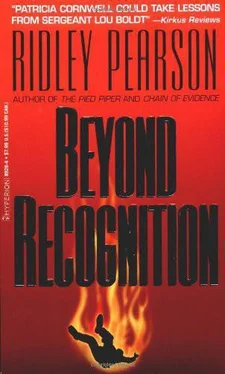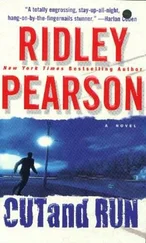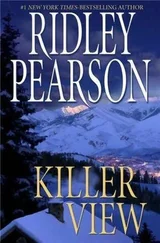Ridley Pearson - Beyond Recognition
Здесь есть возможность читать онлайн «Ridley Pearson - Beyond Recognition» весь текст электронной книги совершенно бесплатно (целиком полную версию без сокращений). В некоторых случаях можно слушать аудио, скачать через торрент в формате fb2 и присутствует краткое содержание. Жанр: Триллер, на английском языке. Описание произведения, (предисловие) а так же отзывы посетителей доступны на портале библиотеки ЛибКат.
- Название:Beyond Recognition
- Автор:
- Жанр:
- Год:неизвестен
- ISBN:нет данных
- Рейтинг книги:5 / 5. Голосов: 1
-
Избранное:Добавить в избранное
- Отзывы:
-
Ваша оценка:
- 100
- 1
- 2
- 3
- 4
- 5
Beyond Recognition: краткое содержание, описание и аннотация
Предлагаем к чтению аннотацию, описание, краткое содержание или предисловие (зависит от того, что написал сам автор книги «Beyond Recognition»). Если вы не нашли необходимую информацию о книге — напишите в комментариях, мы постараемся отыскать её.
Beyond Recognition — читать онлайн бесплатно полную книгу (весь текст) целиком
Ниже представлен текст книги, разбитый по страницам. Система сохранения места последней прочитанной страницы, позволяет с удобством читать онлайн бесплатно книгу «Beyond Recognition», без необходимости каждый раз заново искать на чём Вы остановились. Поставьте закладку, и сможете в любой момент перейти на страницу, на которой закончили чтение.
Интервал:
Закладка:
Daphne felt a chill all the way to her toes. As quickly as Emily talked, Daphne attempted to reconstruct how she might arrive at such things. Some of it might be explained by Daphne’s appearance, her choice of dress, her use of makeup, but how could she know about Owen’s daughter Corky? How could that be explained? She couldn’t allow herself to be led; she needed to take control. “It’s my dream I’m concerned with,” Daphne said definitely, in a dry, flat tone.
“No, my dear. I don’t think we can deal with the dream until I’ve convinced you, and I haven’t convinced you, have I? Not yet. Not entirely. I’m sorry. It’s a two-way street, and I feel you tensing, and I’m afraid I haven’t got much else to offer. If you like-no charge. You can go. We can try again another time or not, as you like.”
One hell of an effective sales tool, Daphne thought. Offer the door for free, or more to stay. Amazingly, Daphne found herself more convinced of this woman’s authenticity than she was willing to admit. “No,” she said, “I’d like to stay.”
A quiet descended over them as the psychic appraised her, only the light New Age music playing. The other woman’s brow knitted and she whispered, “There’s another man, isn’t there?”
Daphne felt her eyes pool with tears, her gut wrench. This was too much! “This is not about me,” she blurted out, feeling violated and invaded, taken advantage of. The only image before her was the face of Lou Boldt. She felt saddened to her bones. She felt exhausted. Finished. She wanted no more of any of this-no psychic, no Owen, no police department.
“Of course it’s about you,” Emily said. “It’s in the past now, isn’t it? In the past, but always in the present.”
“I will not talk about this!”
“No,” Emily said. “There’s no reason to talk about it, is there? What’s in the past is better left there.”
“You’re staring at me.”
“I’m looking at you, yes.” She hesitated and then said, “I think we can talk about that dream now. What do you think?”
A guess, Daphne decided. The woman had made a lucky guess, had scored a bull’s-eye, and had pursued it until to try for anything more risked the guess revealing itself as such. She knew nothing of it. She was no mind reader. Daphne had not been thinking about Lou. Or maybe she had been; she wasn’t sure. She felt confused and angry. Confusion was a foreign country to her; she didn’t speak the language or know the customs. She returned to her years of reading, of study, of conducting interviews, of forming psychological profiles. She stepped toward its safety as a person lost in the dark will head for even a faint glimmer of light.
Daphne inhaled a long slow breath, collecting herself. She closed her eyes slowly and said dramatically, “In the dream it is always the same: a man … I can’t see his face. He never looks at me, never directly at me. He’s a strong man. Imposing. And I see people burning,” she said, in a hoarse, dry, frightened whisper, knowing without opening her eyes that she had gained control of the other woman. “Houses burning. White-hot flames. Dancing flames. Women burning.” She saved the best for last.“Never his face. Just his …” She squinted tightly and shook her head no. She waited for the other woman.
“What, dear?” Emily asked.
“His hand. A burned hand. Disgusting. Fingers burned …”
Emily gasped audibly.
Daphne opened her eyes, containing her delight. Touche! The psychic paled considerably. Daphne asked, “What is it?” And then, reversing roles completely, she sat up straight and said, “Do you know this man?”
The psychic shook her head no.
“You’ve had the same dream?”
No again. Emily’s eyes remained enlarged. She was preparing some comment to make, preparing to take back control.
Daphne had to speak, to maintain her position. “You’ve met him,” Daphne stated plainly. “He came here.” She looked around the room and put onto her face her best mask of terror. She crossed her arms tightly, as if fending off the cold. “He’s been in this room,” she stated, noting with great satisfaction that Emily remained pinned by her comments. “Who is he?” Daphne asked. “Why have I seen him in my dreams?”
She waited, uncrossing her arms and placing her hands on the table before her. She leaned forward. “Who is he that he enters my dreams this way? Is he going to kill me? Is that it? Is it the man burning these houses? Is it the news? Is that all?”
“Who are you?” Emily choked out.
“You’ve seen that hand. I know you’ve seen that hand.”
The other woman’s face took on a look of terror. “You’re a friend of his. His girlfriend? You’re checking up on me?” She allowed it to slip.
“You have seen him!”
“You’re lying to me,” Richland said, her eyes lowered dangerously. “Do not lie to me.”
“The hand,” Daphne repeated. “You’ve seen that hand. I know you have. I saw how you reacted. I can tell you’ve seen that hand. Why? Why have I come here to you?” She tried to sound as emotionally unstable and fearful as possible. “I could have gone to any psychic. Why you?” Feed the ego , she reminded herself, having used this same principle on dozens of suspected felons.
“Because I can help you,” Emily answered, the suspicion in her eyes lessened. “Tell me about the dream.”
Daphne asked, “Am I psychic? Is there a way to stop it, control it? I don’t like these dreams. I don’t want any more of them. Is that how it starts? A dream? Dreaming?”
“We all have the ability to glimpse the future,” the woman answered clearly. “We’ve all done it: thought of an age-old friend whom we haven’t seen in years just moments before the phone rings and it is that friend on the line. Worried for a friend or relative, only to discover something terrible-or even something wonderful-has happened. Although I’ll tell you this,” she said, as an aside. “The dark, the evil, is somehow more powerfully transmitted than the good. It has been said that people close to those who have died have experienced a pain or even fallen to the floor, which, when traced later, can be connected to the exact moment of this other person’s death. Skeptics call this coincidence. I call it the Power. The difference between those people and me-between you and me, my dear-is that I can summon the Power. I can harness it. Connect with it, at my choosing. But at its core, it is no different from your dreams. Yes, I can tell that you’ve connected during those dreams. Something in this man has stirred a place in you. There may be others with this same dream; there may be none. None of that matters. What matters is that you’ve connected. And yes,” she said-answering honestly? Daphne wondered-“so have I. I know the man. I’ve seen him. He has sat in that chair.”
Daphne leapt from the chair and bumped the table in the process, and although the psychic reached out a steadying hand, the tarot deck separated and spilled across the surface, and a single card fell to the floor. The psychic stared at the card-which was face down-and a growing menace filled the room. “I’m sorry,” Daphne apologized. But Emily Richland waved off her apology and, stooping, reached for the card and turned it face up.
“Death,” she announced, her eyes finding Daphne’s. “It can be a good card,” she said, “but not always.”
Death had occupied a place in Daphne’s life since she was a child. Through her years of study and soul-searching, and some time on the therapist’s couch, she had come to understand that death is an integral part of life, but as a child she was far from that knowledge, that understanding. For years she had identified with the character of Scout in the movie version of To Kill a Mockingbird (she had not read the book until a young adult): the young tomboy, raised in Kentucky bluegrass country, surrounded by wealth, privilege, and death. Her father, like Atticus, a defense attorney, had won and lost cases where men’s lives were at stake. Her first close look at death was when her pony, Dell, got colic and died on a Saturday night in August. Daphne had spent that night in Dell’s stall; despite everything done for her, the old girl cried out in pain and died, Daphne’s arms clenched around her sweet-smelling neck, tears pouring out.
Читать дальшеИнтервал:
Закладка:
Похожие книги на «Beyond Recognition»
Представляем Вашему вниманию похожие книги на «Beyond Recognition» списком для выбора. Мы отобрали схожую по названию и смыслу литературу в надежде предоставить читателям больше вариантов отыскать новые, интересные, ещё непрочитанные произведения.
Обсуждение, отзывы о книге «Beyond Recognition» и просто собственные мнения читателей. Оставьте ваши комментарии, напишите, что Вы думаете о произведении, его смысле или главных героях. Укажите что конкретно понравилось, а что нет, и почему Вы так считаете.












